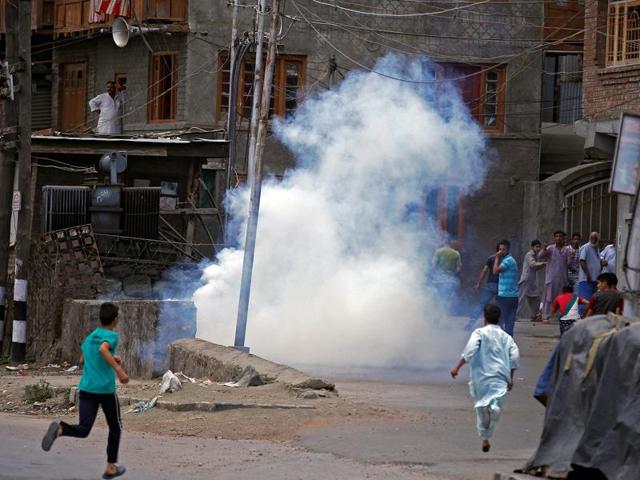All-party delegations to commissions: Delhi’s attempt to engage with Kashmir
Since the onset of militancy in Jammu and Kashmir in 1989-90, the Centre has made numerous efforts to resolve the issue.
Prime Minister Narendra Modi will hold an all-party meeting on Friday as part of the Centre’s effort to once again find a solution to the cycle of violence in Kashmir, where at least 60 people have died and thousands injured following the killing of Hizbul Mujahideen commander Burhan Wani on July 8.

Since the onset of militancy in Jammu and Kashmir in 1989-90, the Centre has made numerous efforts to resolve the issue.
The first time an all-party delegation visited Kashmir to assess the situation was in January 1990. It was headed by the then deputy prime minister Chaudhury Devi Lal and included among others the then leader of opposition Rajiv Gandhi.
The visit came against the backdrop of the kidnapping of the then Union home minister Mufti Mohammad Sayeed’s daughter Rubiya Sayeed and the subsequent release of militants in exchange for her freedom.
After spending two days in Srinagar, the all-party delegation returned to Delhi. One of its suggestions included the appointment of political advisors to the then governor Jagmohan and accordingly George Fernandes was made a minister for Kashmir affairs.
Prior to that, General KV Krishna Rao resigned as the governor and was replaced by Jagmohan. Soon after, National Conference leader Farooq Abdullah resigned as the chief minister.
During the tenure of former prime minister Atal Bihari Vajpayee, the Centre held its first ever talks with Kashmiri separatists. The meeting on January 22, 2004, saw five separatist leaders shake hands with the then deputy PM LK Advani to find a solution to the Kashmir issue. Vajpayee too had a photo-op with the Hurriyat leaders.
Read | Like the 2010 all-party delegation, will this one soothe Kashmir unrest
The second round of talks between Advani and the Hurriyat Conference was held on March 27, days before the Bharatiya Janata Party-led National Democratic Alliance government was voted out of power in the 2004 Lok Sabha elections.
But before that, the Vajpayee government in February 2003 appointed former home secretary NN Vohra as the Centre’s interlocutor for Jammu and Kashmir. The mandate of Vohra, who is the current governor of the state, was to hold dialogues with different shades of opinion in the state to hammer out a solution to the Kashmir issue.
Throughout his tenure, Vajpayee laid special focus on the troubled state and also appointed former Research and Analysis Wing (RAW) chief AS Dulat as his advisor on Kashmir affairs.
The first major initiative by the United Progressive Alliance-I government under the then prime minister Manmohan Singh was the announcement of a roundtable conference in Delhi in February 2006. While all mainstream political parties attended, the separatist camp boycotted it. The second roundtable was held in Srinagar in May 2006 and the separatists again boycotted it.
In May 2006, Singh announced the setting up of five working groups to resolve the issues confronting Jammu and Kashmir. The groups were assigned for improving the Centre’s relations with the state, furthering the relations across the Line of Control (LoC), giving a boost to the state’s economic development, rehabilitating families of militants and reviewing the cases of detainees and ensuring good governance. All the groups gave their recommendations but none has been implemented yet.
One group, headed by the now vice-president of India Hamid Ansari, recommended the repeal of the Armed Forces Special Powers Act (Afspa) which has now become a bone of contention. Former diplomat MK Rasgotra was the chairperson of the group on simplifying procedures to facilitate travel across the LoC. Former Reserve Bank of India governor C Rangarajan headed the group on economic development, employment generation, balanced regional and sub-regional development while the former chief justice of India AM Ahmadi was the head of the working group on matters related to J-K’s special status. The fifth group on good governance was headed by NC Saxena.
After a brief lull, Kashmir erupted again in June 2008 over the alleged transfer of forest land to the Amarnath shrine board to manage the annual pilgrimage. An all-party meeting convened by the then PM Manmohan Singh appealed for calm after weeks of violence in which more than 60 people died. Later, an all-party delegation headed by the then home minister Shivraj Patil toured Kashmir to douse the fire.
Read | Mainstream J-K parties yet to be invited to Centre’s all-party meet today
Again on September 20, 2010, a 39-member all-party delegation visited Kashmir to assess the situation in the wake of violence that claimed more than 120 lives in three months from June. The delegation gave eight suggestions, including appointing a team of interlocutors.
The interlocutors – journalist Dileep Padgaonkar, academician Radha Kumar and former information commissioner MM Ansari – were appointed in October 2010. They were tasked to begin a process of sustained uninterrupted dialogue with all sections of people of Jammu and Kashmir, especially with youths and students and all shades of political opinion.
In their report submitted to the then Union home minister P Chidambaram in October 2011, the interlocutors laid down a road map for the government to address all issues pertaining to the state. Among the recommendations included regional councils for all three regions – Jammu, Kashmir and Ladakh – to address local aspirations apart from improving governance with a focus on women and children.
Their recommendations, that also contained suggestions to announce financial packages in terms of jobs, rehabilitation of families of victims of violence and reducing the number of troops in civilian areas, are yet to be implemented.





